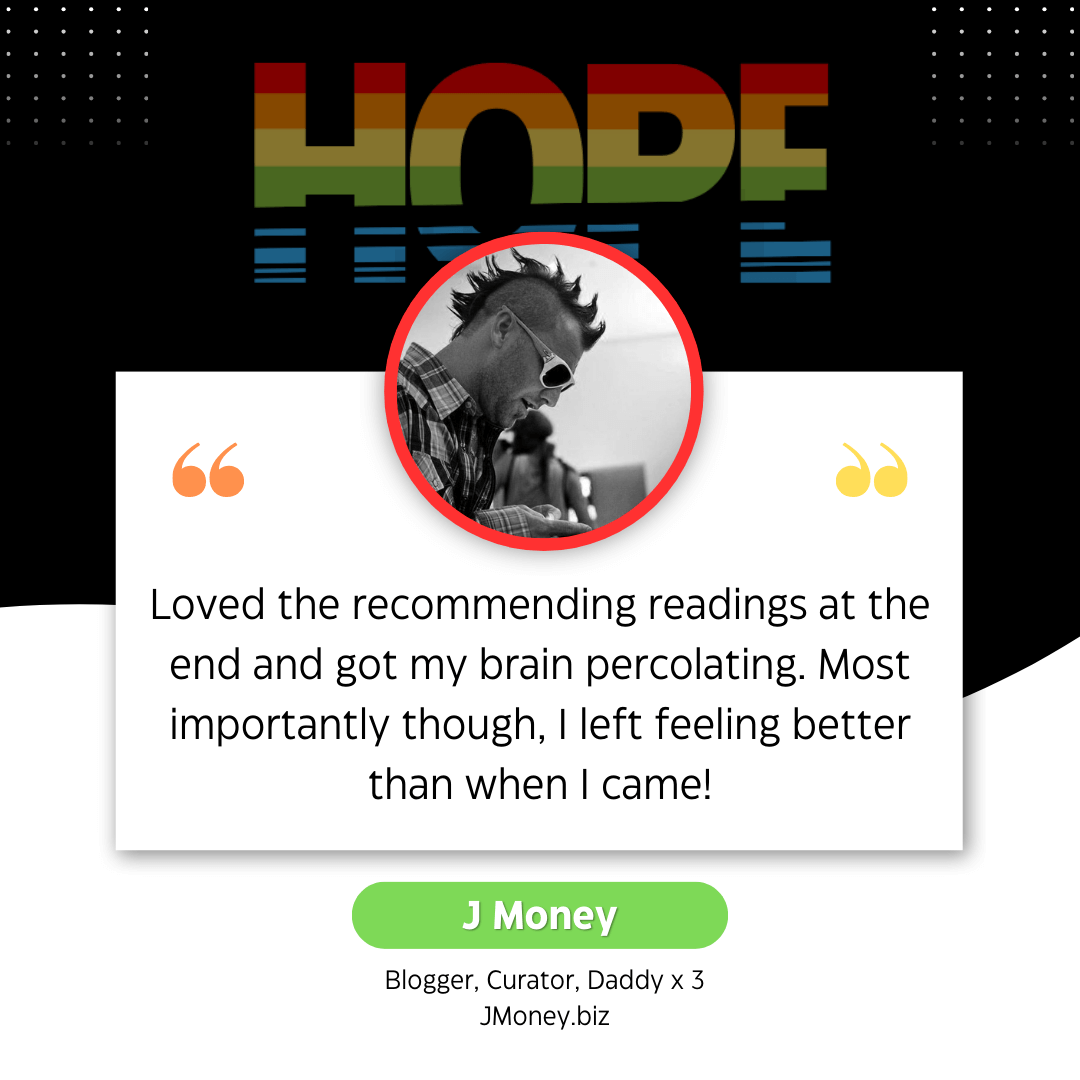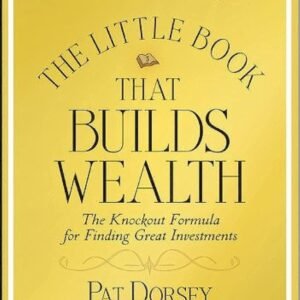At the beginning of the year, I was publishing a newsletter that addressed hope in dark times, tackled from an array of different perspectives. I’ve since abandoned the project in favor of another new one that I’m incredibly excited about (more on that soon.) But over the past few weeks I’ve been hearing from a lot of people short on optimism. And I just wanted to let you know that you don’t have to force yourself into toxic positivity to maintain hope. To pull off incredible things, whether with your money or just in life generally.
So I’m publishing this one edition of the newsletter here — one that went live in January. I hope it’s helpful. A few people seemed to like it while it was around!

I was busy fighting systems. A dark cloud followed me around back then. I knew what I was doing was necessary, but I wasn’t sure I would win.
In fact, in that particular moment, I was pretty confident I was going to lose. I could find no hope. So I decided to strip ‘hope’ from my definition of meaning.
I wracked my brain, scrolling the open tabs in the back of my mind. Those that have remained unviewed so long that they collect a thick layer of dust. I searched and searched for a belief system void of hope, yet full of meaning.
Finally, I pulled up the right tab. I was brought back to Norse mythology. The names of Odin, Thor, Frigga. Names so important in our language that they have their own days of the week, but stories we are so disconnected from we don’t even recognize the morphology.
I, like most of us in our society, am disconnected from these stories. I am not certain my interpretation of them is correct. Erroneous as they may be, my recollection of them helped steel me.
I remembered a story about Ragnarök. The story wasn’t character-heavy so much as philosophy-heavy. The entire time Odin and his family are doing their thing, they’re actively fighting the giants. When the giants win, Valhalla will fall.
And it is when – not if. The Ragnarök prophecy will be fulfilled, and everyone knows it. There is no way for ‘good’ to win. There is absolutely no hope.
Why, then, do the gods – imperfect beings as they are – keep trying? Keep fighting?
According to my understanding of the mythology, it’s because the only glory is to go down swinging.
‘Evil’ will always win under this philosophy. But that doesn’t excuse us from giving it our all. Even if there is no promise of a greater heaven – even if there is no hope for eventual harmony – the fact that you’re sticking up for the right thing still means something. And maybe – because you know you’re going to lose – it even means a little bit more.
TIP: If you want to hear about Norse mythology from someone who knows what they’re talking about, check out this channel.
Counterintuitively enough, this nihilistic thought process brought me out of my nihilistic despondency. Yes, I might lose. There might even be a very good chance that I’d lose.
But that didn’t mean self-advocating wasn’t meaningful. In fact, the act of doing so was the glory unto itself. Even if it wasn’t successful.
I found the motivation I needed to keep going. I resigned myself to losing, but kept filing the paperwork anyways. Kept making the phone calls anyways. Showed up day after day anyways. I would not disappear.
You want to know what happened? Once I pushed far enough into the process, they folded. Gave me everything I had asked for.
In other words, I won. A task I had previously thought impossible.
I am not saying this cold interpretation of the world is always the answer. After all, meaning can and arguably should change.
But if you find yourself in dark times beyond the reaches of hope, it can be a philosophy that sustains you while you do what you need to do. It can be a thought process that compels you to move forward, even when freezing up feels like the only thing of which you’re capable.
Sometimes when you accept failure as a given, it can mobilize you enough to eek out success.
And even if you’re not successful?
You’re still glorious.
RECOMMENDED READING
Mythology by Edith Hamilton
The Pursuit of the Impossible Makes Humans Powerful
As it turns out, the pursuit of the impossible doesn’t just motivate me. The drive to attempt impossible feats is a shared trait across humanity. I was listening to this podcast a few months ago. It was a lecture from biologist and philosopher Robert Sapolsky. He was talking about what differentiates humans from other species, and the pinnacle of his presentation hinged on our propensity to center the impossible as a moral imperative:
“Our most exalted behaviors come when we believe ‘you’re not going to be able to make a difference,’ ‘that’s the way it is,’ ‘look the other way,’ ‘go back to your own concerns.’ When people are capable of deriving the strength to do x out of the certainty that x cannot possibly be, you get our most magnificent domains of moral imperatives.”
So, then, the way we achieve the impossible is not by denying it is impossible, but by attempting to do it in spite of that fact. We may not be successful. But it’s the attempt that means something.
Now, moral imperatives aren’t necessarily objectively good or bad. Remember that show Lost? Because John Locke’s story arc is a great example, albeit a mystical one.
With apologies to all those born in this millennium, this clip will sufficiently catch you up enough for our purposes today:
The first thing to recognize is that the way Locke’s story is represented influences how the moral imperative is interpreted. Its miraculous or oppressive nature can vary depending on how you’ve experienced disability (or haven’t.)
While I don’t want to ruin the 2004 classic for you 20 years later, the second thing to recognize is that John Locke doesn’t stay a benevolent dude throughout. He’s nuanced, sometimes doing greatly noble things, and other times causing epic destruction. He’s also not consistently operating off of the same moral imperatives. No matter which confusing character arc he’s on, he pointedly reminds the audience of duality – light and dark – throughout the series.
Moral imperatives can motivate us to do massively huge things. They’re not a guarantee that we’ll be successful. But they can keep us moving forward.
Massively huge things are not inherently good or bad. That means it’s a wise idea to constantly keep challenging ourselves – our thoughts, our beliefs, our patterns of behavior – in order to keep our motivation in check. Just because we’re motivated to do an impossible thing doesn’t mean we should do that specific impossible thing.
Once we’ve checked ourselves, we can then move on to striving towards the impossible – whether we believe in our ultimate success or our ultimate failure. The effort is valiant and meaningful either way.
RECOMMENDED READING
Choosing to Prosper by Bola Sokunbi
Setting Impossible Goals Can Get You Out of Your Rut
Around this time of year, you’re going to see everyone telling you to set SMART goals. They’re supposed to be:
- Specific
- Measurable
- Achievable
- Relevant
- Time-based
I actually really like SMART goals. They’re particularly helpful when you’re breaking down a larger goal into smaller pieces.
But I do take umbrage with the ‘A’ in SMART: Achievable.
Think about John Locke. Was it achievable for him to prepare for an adventure hike in the Outback?
A lot of people would say no.
But because he was driven by all the people in his life believing it was impossible, he attempted it anyways.
According to our telling of the Norse gods, they flat out knew their goal wasn’t achievable, and they kept going for it anyways.
Granted, for some people, ‘achievable’ is probably a good guideline. You don’t want to set your hopes too high only to have them dashed, leaving you lower than before. In business or situations where you’re accountable to others, setting achievable goals is particularly important. If the goals aren’t achievable, you’ll have difficulty fulfilling your responsibilities.
But what about those moments when setting any goal feels pointless? When the only achievable things are simply not good enough?
That’s when I like to throw ‘achievable’ out the window.
You’re probably underestimating your abilities
For one thing, while some people may need their positivity reigned in, there are a lot of people who underestimate their own abilities on a regular basis. While we might not think a goal is ‘achievable’ in a realistic way at the start of a journey, the truth is it’s probably more realistic than we give ourselves credit for.
This is likely particularly true in this moment, when we’re coming out of a period of sustained, varied forms of isolation. We know that an absence of external feedback often leads people to underestimate their abilities. If you find your confidence in the gutter after the past few years, that’s actually a pretty normal reaction – even though it’s likely to be an inaccurate depiction of your capacities.
Big goals get you excited, and excitement gets you moving
At times in our lives when we’re feeling low, the same old same old may not cut it. Sure, we could set boring goals that we think we can achieve, but if we’re not motivated to work at them, the probability of said achievement goes down dramatically.
Our biggest, wildest dreams are less likely to come true, but more likely to motivate us. That motivation can get us unstuck.
Which is why it kind of doesn’t matter if the goal is achievable or not.
Believe it or not, this strategy is backed by science. While traditional economic theory purports that we perform for rewards, that actually isn’t always the case. In the paper “Motivated for near impossibility: How task type and reward modulates intrinsic motivation and the striatal activation for an extremely difficult task”, scientists found that the more impossible the task seemed, the more people were motivated to complete it successfully.
There is an asterisk. This type of motivation moved in tandem with the difficulty of the task as long as there was no reward incentive. When the scientists introduced a reward, there was a point where people’s motivation tapered off. The challenge of achieving the impossible in and of itself is exciting. But introducing capitalism kills the vibe.
Even if you miss, you’ll land among the stars
Okay, so you’ve got your big audacious goal. You’re super motivated. But before you start down this path, you have to put the ‘reward’ aspect into perspective. Because in most situations, people do have rewards in mind when they set their goals.
Let’s say you set a goal to save double your salary so you can take a year off to travel the world while still maintaining a healthy emergency fund.
That’s an absolutely outrageous goal, right?
Except if you start breaking the goal down into manageable chunks and work away at it, you’re likely going to get further than you may have originally thought. Let’s say you don’t save double your salary in the allotted timeframe, but you do save 150%. That is still an impressive feat, and puts you leagues ahead of where you would have been if you hadn’t been motivated by your big, ridiculous goals.
It’s kind of like that admittedly cheesy but also incredibly encouraging Les Brown saying:
“Shoot for the moon. Even if you miss, you’ll land among the stars.”
When you land among the stars, pivot your goals. You’re going to have a lot more options now that you have 150% of your income saved up. Even saving up 25% is going to open a whole new set of doors. You might not have achieved the impossible, but you did achieve something incredible nonetheless.
Sometimes, though, you’re going to surprise yourself and hit the moon. You’re going to achieve what you set out to do – what you originally thought was impossible. You’ll never know if this is the time you’ll hit or not until you take your shot.
But because we are actually less motivated when there is a presumed reward and the difficulty of the task exceeds the perceived value of that reward, the money itself can’t be the reward. The trip around the world can’t even be the reward.
You have to remove that altogether.
The reward in and of itself is reaching for the impossible. In reaching for what others (or you yourself) tell you that you can’t do.
Here’s to the impossible.
You’re on an oblong orb that’s circling a giant ball of gas at exactly the right distance to maintain the planet’s dihydrogen monoxide, and therefore life. That life eventually differentiated and admixed itself until you were born into existence. The mere fact that we’re all here is a miracle. In this world of miracles, nothing is outside the realm of possibility.
So go ahead. Write down your one, big audacious goal. Maybe it’s the one that makes you feel alive. Maybe it’s one that allows you to keep pushing forward when you’re pretty certain failure will be the ultimate outcome. At the end of the day, it has to be one you think you can’t achieve. We’re aiming for the moon here.
Once you’ve got the big picture in mind, start breaking it down into smaller chunks. Make these smaller chunks SMART goals if you so wish – just don’t put unjust limits on the realm of ‘Achievable.’





















Leave a Reply